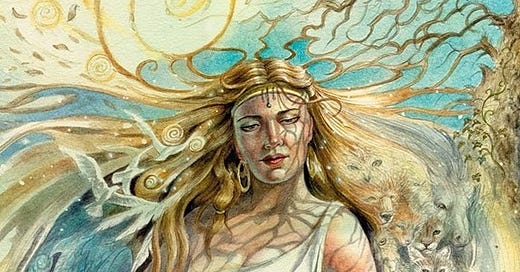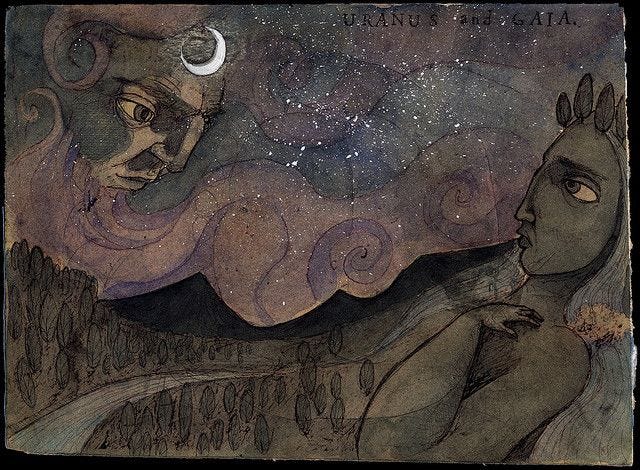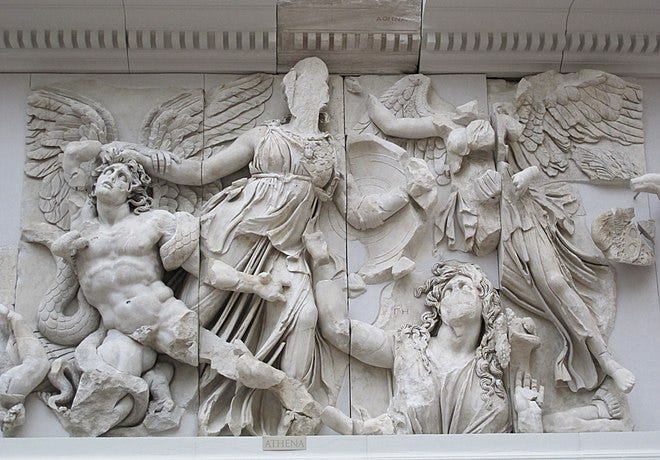Primordial Deity – Gaia [2nd]
From the “Ancient Greek Mythology Series” – The Foundation of the World
Hello there!
Did you know that the ideas present in Ancient Greece still live and perfectly function nowadays? The amount of similarities that a person can find even from the modern perspective of the world’s origin / operation is tremendously huge.
There are many examples of it: from the Big Bang, deceitful plexus of sly betrayals among Gods that are embodiment of human vices, or vice versa, to Plato’s ideas on the governmental structures in his works such as Republic.
Enough of that, today we will continue the journey, and our next stop is Gaia, or the Mother of Earth, or the mother of all life.
Gaia – Γαῖα.
“No man is as wise as Mother Earth. She has witnessed every human day, every human struggle, every human pain, and every human joy,” ― Anasazi Foundation
Out of Chaos came Gaia, the first being who would produce all others. Gaia is basically a personification of the Earth and, unlike Chaos, she has been worshiped. Greeks were not the only ones who actually thought of the Earth as a Goddess, which is understandable because primordial deities (as you have seen with Chaos and will see further in this series) appeared in most of the cultures – sometimes really alike, sometimes only distantly.
She has given birth to many creatures afterward, but there were two first ones, Pontus1 and Uranus 2(or Ouranos), but we will focus on the second one more because he played a bigger role. You may wonder: “If her child was Uranus, and she was his mother, who was the father then? Chaos?” Well… How to break it to you? No, Chaos was not.
The thing was that Chaos was not a let’s call it “a God with a physical form” unlike other ones. Chaos was a state, and She could not make love to Gaia. Interestingly enough, Uranus simply does not have a father as Gaia, the mother of all living, managed to conceive a child without help.
Well, that’s life. Everything happens.
So, if Chaos did not have a “physical form” was Gaia also a state rather than other Gods who follow her, for instance: Zeus, Aphrodite and others? Here you may find the answer:
In Athenian vase painting she was shown as a matronly woman only half risen from the earth, often in the act of handing the baby Erichthonius, a future king of Athens, to Athena to foster. In mosaic representations, she appears as a woman reclining upon the earth surrounded by a host of Carpi, infant gods of the fruits. She was also worshiped under the epithet “Anesidora”, which means “giver of gifts”
Thus, no — Gaia was not a state, but she actually had a body which she could use to travel around the earth. Greeks were not very strict here (as you will see later on as well) because they often could refer to earth (in general) as Gaia, and also to the goddess as Gaia. The same happened to Tartarus3, the third primordial god, and many others → Tartarus was a place where wicked ones were held, and also a God with his own body and will.
Gaia and Uranus did not hold a relationship as mother and on would hold in our times. They were lovers, who did not keep their lustful urges away and got soaked in the nectar of love, which led to other living beings, their children, but about them later.
Uranus covered Gaia from all sides, as sky must do, but he also covered her in other meanings, as you might observe.
Thereby, can we justify those who have strong affection and desire towards their mothers nowadays and tell that they have just the old steps of our creators? You can try, of course, but I do not think many will tolerate this.
“The world has moved on,' we say... we've always said,” — Stephen King
Well, the world has moved on, as well as our traditions and moral codes. Not a wise thing would be to repeat what it is long gone.
They have not only given birth to their children, the Second Order, but also, as the result of their love, something remarkable happened: Time began. In fact, there was no time before it, and so there was no “before” before (thanks, tautology) Chaos and Gaia.
“Time is a river of passing events — a rushing torrent,” — Greek Proverbs
Her life and impact in the history is not over yet, there is much to be told, but her following story will be crucial to explore other gods and goddess in the future posts. We will meet Gaia many times in the future, but next time you will be prepared and have enough knowledge of Her origin to build up your intelligence and get wiser.
One thing to note: Gaia and Uranus, their unique bond, brought the world twelve robust, healthy children: six of whom were men, and the other six were women. Those children were called “The Second Order,” whom will cause the world many pleasant and dreadful events; the story will be told, yet it is an untold story today, which will be the most moving.”
Gaia (bottom-right) rises out of the ground, Pergamon museum, Berlin
Next stop: the primordial deity – Gaia, the mother of earth, hills, valleys, caves and mountains, and first anthropomorphic Goddess from the Greek perspective of the world creation.
For those with innate, unquenchable curiosity to explore:
Writer’s note:
Why do I write this? I have set a clear goal and challenge for myself to be consistent and learn new things as well as teach them. This journey is an obstacle for me more than for others. An opportunity to re-learn how to learn, acquire new information and not to stagnate having been affected with laziness and decay of human mind.
This month, precisely January, is the month of exploring Ancient Greek Mythology, which I am to take and kindly invite you to walk side by side with me.
If nothing happens, next project will be about Scandinavian Gods, perspective of the world, creation, and destruction of it, but… This is an issue of the future me, not this one.
I am grateful to anyone who reads it.
Pontus – the primordial god of the sea. He was the sea itself, not merely its resident deity, who was born from Gaia at the dawn of creation.
Uranus – the personification of heaven. According to Hesiod’s Theology, Gaia (Earth), emerging from primeval Chaos, produced Uranus, the Mountains, and the Sea (Pontus).
Tartarus — In Greek mythology, Tartarus is both a deity and a place in the underworld.





